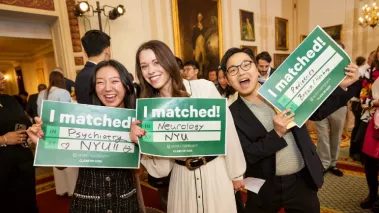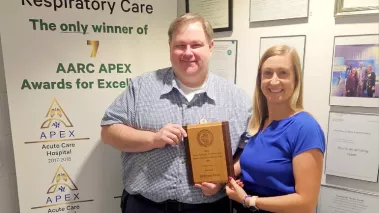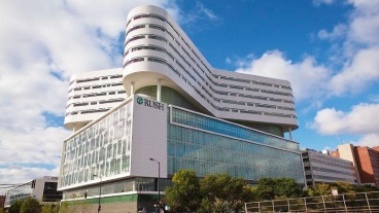Collaboration with city, health systems and shelters provides protective supplies and symptom-specific housing
When an outbreak of COVID-19 occurred in early April at a substance use disorder unit in Chicago's West Loop, tests conducted by Rush University Medical Center confirmed that half of the 60 people tested were COVID-19 positive, yet all were symptom-negative. Something had to be done, and quickly.
In response, the newly formed West Side homeless COVID workgroup got to work. The workgroup decided, ahead of the federal Centers for Disease Control and Prevention's recommendations, that every client and staff member in every shelter in Chicago needed to be masked.
“Last week, our group pushed the city to make masks available to every person living or working in a shelter or congregate treatment facility, such as a detox program, transitional housing or mental health agency," says Steve Rothschild, MD, medical director for population health and chairperson of the Department of Family Medicine at Rush.
Mobilizing the plan
People living in homeless shelters and treatment facilities are at heightened risk from the COVID-19 virus. They're often more likely to become infected, and to become severely ill from it, due to their close proximity to each other and health conditions that often accompany homelessness and substance misuse.
To address this risk, the workgroup determined that in addition to masks, other supplies such as gloves and sanitizer also were needed. Then the workgroup had to figure out how to get supplies to this population and how to house the homeless in various stages of COVID-19.
Meeting twice every day by conference call, including weekends, since March 13 with all stakeholders and medical providers participating in the afternoon meeting, they mapped out the following plan for homeless housing and medical support:
- Franciscan Outreach, a homeless services organization, will house asymptomatic people at various locations.
- An empty boutique hotel, Hotel 166, has been set up for symptomatic people where they can get tested and receive meals and support services.
- The homeless services organization A Safe Haven is offering round-the-clock care for recovering COVID-positive homeless individuals.
- The Salvation Army will house asymptomatic returning citizens (formerly called ex-offenders) at various locations.
- Medical care givers provide screenings at all sites.
Since masks are in such great demand, the Chicago Department of Public Health coordinated with Project HOPE, a global health and humanitarian relief organization, to donate 25,000 masks. Within hours of the decision to get staff working in shelters masked, the city of Chicago responded, and 36 hours later, city workers delivered 25,000 masks and other personal protective equipment, including gloves and hand sanitizer, to Rush's West Side warehouse. Once there, Rush Medical College student volunteers assembled the equipment into individual kits.
“The students mobilized to create packages for every facility in the city, based on the number of people staying there, and helped distribute them," Rothschild explains. “For those agencies that could not come and pick up their packets, the students brought it to them."
The kits then were distributed to nearly all of the 97 shelters and transitional housing units in Chicago.
An insider working on behalf of outsiders
The West Side homeless COVID workgroup was born when student-run clinics through Rush had to be canceled to protect students from the emerging pandemic. During that same time, Franciscan Outreach had its first guest transferred to the hospital with flu-like symptoms.
“We began by just trying to reduce the impact at Franciscan," Rothschild says.
Starting out with just Rush and Franciscan Outreach, the workgroup began to grow. It soon included three other major health systems (Cook County Health, UChicago Medicine and UI Health), two federally qualified health centers (Lawndale Christian Health Center and Heartland Alliance) and CDPH.
To determine the best ways to provide resources to the homeless population while still keeping volunteers and staff at support sites safe, the workgroup continued to expand and began working with shelters across the city, including A Safe Haven, Salvation Army and the Pacific Garden Mission. Additional support sites also have been developed through Franciscan Outreach. A YMCA of Metropolitan Chicago location, for example, has been converted to a shelter site.
“It is kind of amazing and inspiring. We have all learned so much from each other," Rothschild says.
“Rush has a unique ability to bring people together, and I think we are credible in both 'inside' and 'outside' roles," he adds. "'Inside' meaning that as one of the largest academic health centers in the city, we are clearly a strong institutional partner, with strong ties to all aspects of city governance and agencies.
“'Outside' in that we are not afraid to advocate for the community, and are known for speaking out for the vulnerable and underserved. In this collaboration we are playing both roles."
New team will assist residential facilities
Because needs surrounding the pandemic change so quickly, and the most vulnerable populations are affected the most, a new team is developing to better respond to these needs.
Rothschild says a COVID Community Rapid Response Team is in the works that will go out and evaluate outbreaks in residential facilities, offer testing and provide support for staff in separating clients and reducing everyone's risk of contracting the illness.
Even with a new team on the horizon, Rothschild admits there's still even more work to be done.
“The disease is moving very quickly, and the demand is also growing," he says. “So we hope we have got an answer in place that saves lives. The scale of the crisis is daunting, but we can't let that keep us from taking action to try to reduce the magnitude of the problem."







